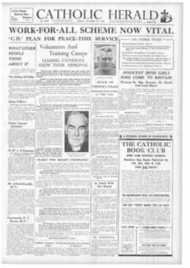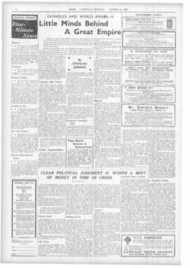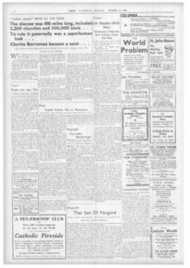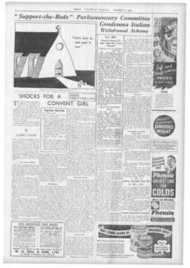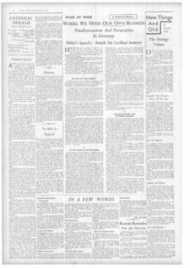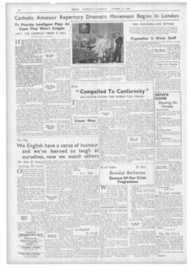Page 9, 14th October 1938
Page 9

Report an error
Noticed an error on this page?If you've noticed an error in this article please click here to report it.
Tags
Share
Related articles
Cardinal Innitzer Rumour
Vatican Reactions
All Austrians Honour Their Cardinal
Austrian Church And State Talks
Move Welcomed By Vatican
Cardinal Innitzer May See Hitler
NO AGREEMENT EXPECTED
Vatican Protest To Berlin : Pope Awaiting Personal Report
LAST SATURDAY NIGHT A ROWDY MOB PENETRATED INTO THE PALACE OF CARDINAL INNITZER, ARCHBISHOP OF VIENNA, DOING CONSIDERABLE WILFUL DAMAGE TO THE BUILDING.
It is authoritatively reported that the Cardinal was not in the Palace at tile time.
The invasion was a reply to a courageous sermon the Cardinal had preached in the Cathedral earlier in the evening, in which the Cardinal told his packed congregation that " in the last few months you have lost everything!'
This sermon marked the end of Cardinal Innitzer's attempt to establish a religious peace with the Nazis. The attempt has failed. Cardinal Innitzer is now in line with his German brothers openly urging Catholics to resist anti-Catholic measures.
It is stated that Cardinal Innitzer will shortly have an interview with Herr Hitler.
STORY BEHIND " HEIL HITLER " CARDINAL
From Our German Correspondent
Cardinal Innitzer's hope that the Austrian Hierarchy's declarations at the time of the Hitler plebiscite would contribute to establish friendly relations between the State and the Church has not been ful filled.
The failure was " strikingly " proved by what has happened in the last week. Nazi mobs have penetrated into the Archbishop's Palace on St. Stephen's Square in Vienna and have demolished part of the furniture. Other furniture, as well as files and documents were thrown through the windows and set on fire. Hostile cries like " down with the clergy," " send the Cardinal into a concentration camp," " traitor bishop " and so on were heard.
Since a circular letter of Mgr. Waltz, Archbishop of Salzburg, to his clergy was published by the magazine of the French Jesuits, Etudes, we know how the famous " pro-Nazi" declarations of the Austrian Hierarchy originated in March, 1938.
They were not drafted by the Bishops but by the Nazi Commissioner, Herr Buerckel, who brought Cardinal Innitzer deliberately into a position where his signature seemed to him a lesser evil.
In the beginning a few concessions were made by the Nazis. When Vienna had been occupied by the German Army, one of the first decrees abolished school prayers. When Cardinal Innitzer complained about that Herr Buerckel ordered immediately the withdrawal of the decree.
But in all the really important matters, e.g., the dissolution of Catholic organisations and schools and the confiscation of Catholic property, the Bishops obtained nothing but vague promises that their complaints would be sympathetically considered.
Persecution Starts
But, more and more, the same persecution of Catholics as in the old Reich was carried through in the Austrian territories. Priests were arrested and brought into con centration camps. All Catholic private schools, elementary as well as secondary, were deprived of State recognition and the right to hold examinations, and most of them were simply dissolved. Nuns were expelled from the schools. The Faculty of Catholic Theology at the University of Innsbruck • was dissolved. If that could be at least partly justified, because it was a public Faculty, financed by the State, the matter was different for the suppression of the two Catholic Faculties of Salzburg, which were to become, according to the special wish of the Holy Father, a Catholic University for the German-speaking countries.
Those Faculties were not financed and administered by the State so that their suppression by the Nazis can only be described as an act of brutal persecution.
In Private
Of course, Cardinal lnnitzer and Archbishop Waltz protested against all those things. In the beginning they did not do it in public, hoping that the very discreet and friendly form of their interventions might be more successful than the energetic protestations and pastoral letters of the German Hierarchy.
But they found very soon that their apparent silence contributed to the confusion and uncertainty among, Austrian Catholics.
Public Protests So the Salzburg conference of the Austrian Hierarchy adopted two pastoral letters which were to he read froal all pulpits. The first protested against the new marriage and divorce laws and explained the Catholic teaching about marriage and divorce (the document was very prudently worded and avoided too outspoken criticism of the Nazi ideology); the second insisted on the importance of Catholic schools and protested against the expulsion of religious from schools which they had founded and directed for many years.
Confusion was systematically created in Catholic circles by a so-called "Committee for Religious Peace" which was in reality an agency of the Nazi party with the object of undermining in the clergy and among the faithful the authority of the Holy See.
There were a few priests on the "Committee," e.g., Fr. Van Bergh and Fr. Pircher, and, owing to a continuous exploitation of the first episcopal declarations,
those people succeeded in doing much harm.
Several Bishops stated immediately that the " Committee for Religious Peace " had not been approved by the Hierarchy and was in no way under the control or supervision of the ecclesiastic authorities. The Osservalore Rotnano and the Vatican Radio Station warned Catholics several times against the " Committee."
Eventually, two weeks ago, Cardinal limnitzer took far-reaching measures, forbidding all priests, secular or regular, to be members of that Committee or to cooperate with it in any form.
Optional Religious Teaching
Another conflict between Cardinal Innitzer and the Nazis arose over a decree which made religious teaching in schools optional and allowed boys and girls over fourteen years of age to decide themselves, even against the will of their parents, whether they want to attend religious instruction. A special appeal of Cardinal Innitzer was read from the pulpitr asking all Catholic fathers and mothers to realise their responsibility for the religious and moral welfare of their children. The appeal is printed in full in an adjoining column.
Then came Saturday night. Cardinal Innitzer had announced that he would preach a sermon for Catholic youth in St. Stephen's Cathedral. The huge church was overcrowded when the Archbishop mounted the steps of the pulpit.
He said: " In the last months you have lost almost everything. You lost your Catholic youth groups and your Christian unions, but I am sure you will, nevertheless, join with your priests in the great union of the Church. I know that some of you have not approved the attitude of the Bishops in the past, but you did not, perhaps, fully realise the tremendous responsibility of the Hierarchy. Whatever may come, 1 know that there is high principled Catholic youth which will not run after empty phrases . . ."
Immense Applause—
An immense applause greeted the Cardinal when he left the cathedral. but immediately groups of the Hitler Youth and of other Nazis started the countermanifestation—which probably had been carefully prepared beforehand—and a number of young Catholics were seriously wounded.
The police intervened, although obviously very late, and Herr Buerckel, the Nazi Governor of Austria, announced that the responsible elements would be severely punished and put into a concentration camp. We are extremely doubtful about that, particularly because in former similar cases such demonstrations against episcopal palaces had been organised by the high party authorities themselves.
Cardinal Not There
During the rioting the Cardinal was not in his palace. He was away on a visit to a monastery in Vienna.
Interview With Hitler?
It is now expected that Cardinal Innitzer will shortly have an interview with Herr Hitler.
blog comments powered by Disqus


